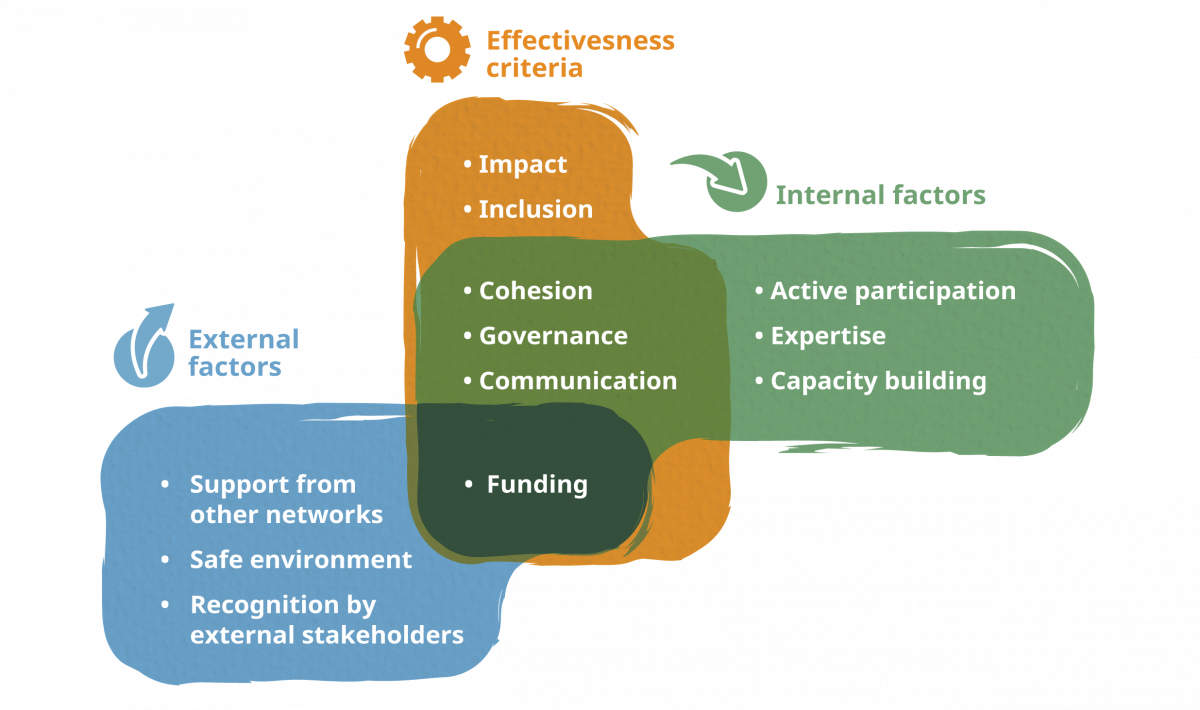

Unsustainable exploitation of natural resources in conflict with customary land rights has increased environmental degradation, land conflicts and accelerated impacts of climate change. Calls for stronger engagement of communities and civil society in the management of natural resources can ensure that people's rights and concerns are integrated in the governance of natural resources they depend on, and prevent land conflicts, deforestation and climate change.
In this context, the question of the effectiveness of civil society networks becomes important when considering policy engagement and new spaces to intervene that build on the experience of these networks in the past 10 to 15 years, and the financial investments in their member organizations.
It is assumed that the more effective the networks, the better they will be expected to achieve their goals and deliver valuable services to their beneficiaries. But as the study shows, effectiveness is a complex, multifaceted concept. Despite this, a number of clear ideas have emerged from the study.
1. ‘Effectiveness’ means different things to different people
The leaders and members of civil society networks take a far broader view of effectiveness than do other groups, especially representatives of governments and donor agencies. To networks, effectiveness means much more than simply achieving goals. It is important, therefore, for governments, donors and NGOs to appreciate how networks define effectiveness and which factors, particularly external ones, improve or hinder it. It is also important for the networks to understand the different perspectives of the external groups that they interact with. This will help networks focus on areas that satisfy the needs of their supporters, while working on the other key internally relevant measures such as resource availability and internal governance structures.
2. Finance is a weak spot
Network leaders and members mentioned sustainable financing of their networks throughout the interviews and surveys as a criterion for assessing effectiveness, and as both internal and external factors influencing effectiveness. Here, the mismatch in perspectives between networks and others matters. International NGOs, donors and government representatives were all less concerned about finance.
3. Communication is central to what networks do
In both regions, survey respondents and interviewees repeatedly raised the importance of communication, both within networks and externally with other stakeholders such as targets of advocacy and the wider public. With members prioritizing information sharing and communication, networks need to invest in effective strategies and systems for internal and external communication. Donors could focus their support on strengthening such systems to enable platforms to meet their needs. By doing so, they could enhance members’ motivation and commitment to network-level objectives. As mentioned by interviewees in donor agencies, digital communication and social media are increasingly important aspects of communication for networks to consider, paying close attention to sensitivity as well as legality risks and restrictions.
4. Networks are vulnerable to turnover in personnel
Network members in the Mekong region and the Congo Basin expressed concerns about the ability of their networks to retain, or cope with the loss of, key personnel. Most CSOs and networks depend to a large extent on volunteers, or pay comparatively low wages. This helps them to overcome resource gaps but unfortunately also results in high turnover, as many leave when opportunities for paid employment arise. This leads to a loss of institutional memory and capacity, and can create a vicious capacity-gap cycle that tends to weaken networks over time as they struggle to motivate and retain competent staff. At the same time, this also implies continuous re-investments in capacity building of new members.
5. The environment in which networks operate is significant
Mekong region respondents ranked government recognition as the most important external factor, while Congo Basin respondents ranked a favourable civic space as most important. In both regions, respondents ranked unsafe working environments for CSOs and activists among the top four constraints. These findings highlight the need for networks to navigate and manage relations with the state. Failure to do so could lead to conflictual relationships, which will limit the intention or willingness of governments to integrate their contributions to different policy processes.
6. The networks value gender equality and social inclusion
Network representatives, donors and international NGOs all cited representation and inclusiveness as a key criterion of effectiveness, although less often they mentioned other criteria. Representation and inclusiveness relates to the ability to amplify the voices of communities, to ensure gender equality and to involve and empower all network members. In the Congo Basin, a slight majority (about 60 percent) of the male and female respondents confirmed that their networks have a gender and social inclusion policy, that the networks feel free to discuss related issues, and that network leaders systematically integrate gender issues into decision-making processes. In the Mekong region, the vast majority (about 90 percent) of male and female network representatives said the same. In both regions, respondents also believe that the leaders of the networks systematically encourage marginalized groups, including women, youth, Indigenous Peoples and people with disabilities, to participate in setting networks’ priorities.
7. It is important for networks to define and assess their effectiveness
Governments, donors and international organizations that engage with civil society networks need to understand how these networks define and perceive their effectiveness in order to focus efforts and account for actions taken as they spend internal or externally mobilized resources. Having a shared understanding of what effectiveness means can inspire success and avoid unintended impacts of actions taken by all stakeholders, from network members to donors and international development agencies.
CSO networks can assess their effectiveness using the guide Assessing the effectiveness of civil society networks. This guide allows for a participatory assessment of the main criteria for network effectiveness as well as the internal and external factors that promote effectiveness.

The results of such an assessment will be a rating of the criteria, internal factors and external factors of the network. The assessment can be used to design an action plan to improve effectiveness in the identified areas.
